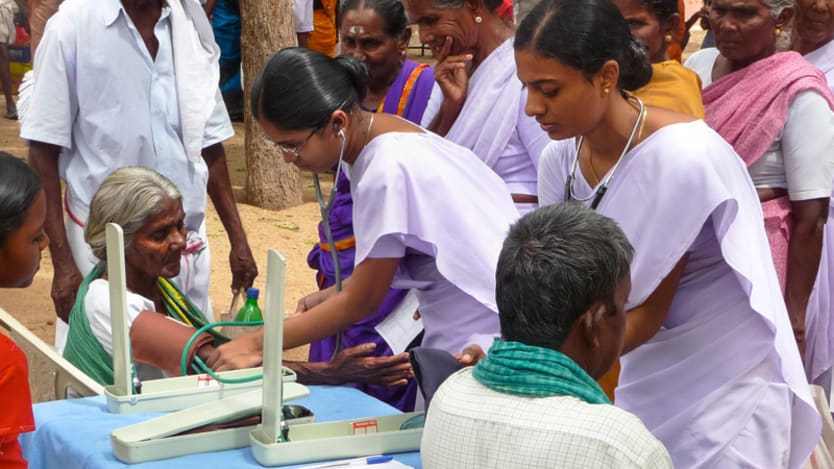
Ratification of the Sustainable Development Goals in September 2015 brought some subtle but important changes to the direction the health care development community will take over the next decade. Most significantly, the word “sustainable” is now enshrined in the headline; sustainable programming is now in the forefront, no longer a nicety but a necessity. And a cornerstone of sustainability is economic sustainability, the ability to stay in business over the long run. Development impact must remain long after the development funding ends.
Despite some well-entrenched perspectives, it is important to note that SDG 3, to “ensure healthy lives and promote well-being for all at all ages,” is not expressed as a concern of the public sector alone. All categories of players must participate to ensure a properly functioning health care system — public sector, private sector, and hybrid public-private partnerships.
The health care market ecosystem is complicated by the fact that the private sector is subdivided. Generally we hear about the public sector/private sector divide, but in health care, the private sector has three distinct subsectors: nongovernmental organizations, faith-based organizations, and for-profit (commercial) entities; the health care development world is quite comfortable working with NGOs and FBOs but not so much with for-profit players. The commercial private sector tends to take a different view of sustainability than the other categories of players, but this view may not be well understood by the development community.
Meeting needs
What is that commercial sector view? It is a view largely set by the capital markets where commercial players access finance. As an October 2011 article in Harvard Business Review pointed out, “investors increasingly seek out companies with positive environmental, social, and governance performance not because they are morally admirable but because they are more viable in the long run.”
Accordingly, the preferred terminology has shifted from “socially responsible” to “sustainable investing.” This view of sustainability is under-recognized by the development community, since the commercial sector is rarely invited to the table when health care agendas are set.
Further, current development programming primarily focuses on communicable diseases — colloquially known as the “ATMs” (AIDS, tuberculosis and malaria) — as well as maternal and reproductive health. Noncommunicable diseases have largely been bypassed as a development priority, although NCDs are an “emerging pandemic globally with disproportionately higher rates in developing countries.” If development programming will not serve those who require care and treatment for NCDs, this area in particular is a fertile opportunity for commercial private sector involvement.
To inclusively, comprehensively meet the needs of people of all income levels, NCDs and other underserved areas cannot be ignored by the development world because they are “not our diseases.” It will be essential to bring the commercial private sector aboard en masse to complement public sector, NGO, FBO and donor efforts. This must be done in a way that recognizes private sector incentives.
Develop sustainable systems
What does this private sector look like?
It depends on objectives and modalities. If there is an externally set, top-down agenda with a direct intervention modality (usually accompanied by grant funding), the private sector will be happy to participate but the players will essentially be government contractors, employing the donor’s money and following the donor’s agenda in a search for impact — but not developing sustainable market systems.
This is currently a widespread view of what it means to engage the private sector in health care development, and one the development world must get beyond if we wish to achieve SDG 3; numerous private sector health care programs are little more than direct interventions employing the private sector as a delivery mechanism.
On the other hand, if there is a bottom-up, demand driven agenda determined by the full range of consumer health care needs — including those not on the top of the donor priority list — and funding comes from the marketplace, there can be full engagement of the commercial sector.
Here’s how to move beyond CSR and social enterprise:
• Bring the commercial private sector to the health care development table as an equal partner;
• Understand what sustainability means to the private sector and design programming around economic viability (being in business tomorrow) as well as impact; and
• Avoid trying to change investor behaviour and instead focus on proliferating economically sound mass market business models that are investable.
A win-win result
How, then, do we get the commercial sector to embrace a pro-poor agenda?
It is easier for investors to get superior returns at the top of the market than at the bottom. In Kenya, for example, the top 5-7 percent of the population enjoys developed-world standards of health care while the vast majority of the population, which earns its income in the informal sector, finds huge areas of their health care needs unmet. The answer is in understanding the right business model that produces a win-win: profitable for business while delivering quality, accessible, affordable care to underserved consumers.
Health care businesses which understand that low-income people are actually the mass market — that they have been looking at things in reverse, and that the top end of the market is actually the marginal market — and develop products and services that deliver value for money to this huge segment, will thrive. The answer to sustainability is not in throwing more money into health care markets, directly intervening to create impact, or capitalizing flavor-of-the-day interventions; it is in discovering and implementing mainstream business models that actually demonstrate economic value to investors while delivering health care to the masses.
The India low-cost model in particular shows promise that can be successfully adapted to other emerging market political economies. The money is already there, waiting in investor coffers, but there are precious few attractive deals in pro-poor health care to put the money into.
Future focus needs to be on developing better business models that meet investor expectations: a shift from trying to convince money to change its behavior and be more “social,” to lower cost delivery models that enable economic viability and attract market capital.
Development actors must get beyond corporate social responsibility and social enterprise and look to just plain “enterprise” if we expect to fully engage the private sector and harness the markets to reach SDG 3.
Making Markets Work is an online conversation to explore what’s being done to make global health care markets accessible to people at the base of the pyramid. Over 10 weeks, Devex and its partners — The Abraaj Group, Philips and Population Services International — will amplify the discussion around effective health financing, analyze key challenges blocking universal market access in the health care supply chain, and explore the key strategies to make markets more effective. Join us as we look at this important issue, and share your thoughts by tagging #MakingMarketsWork and @Devex.








